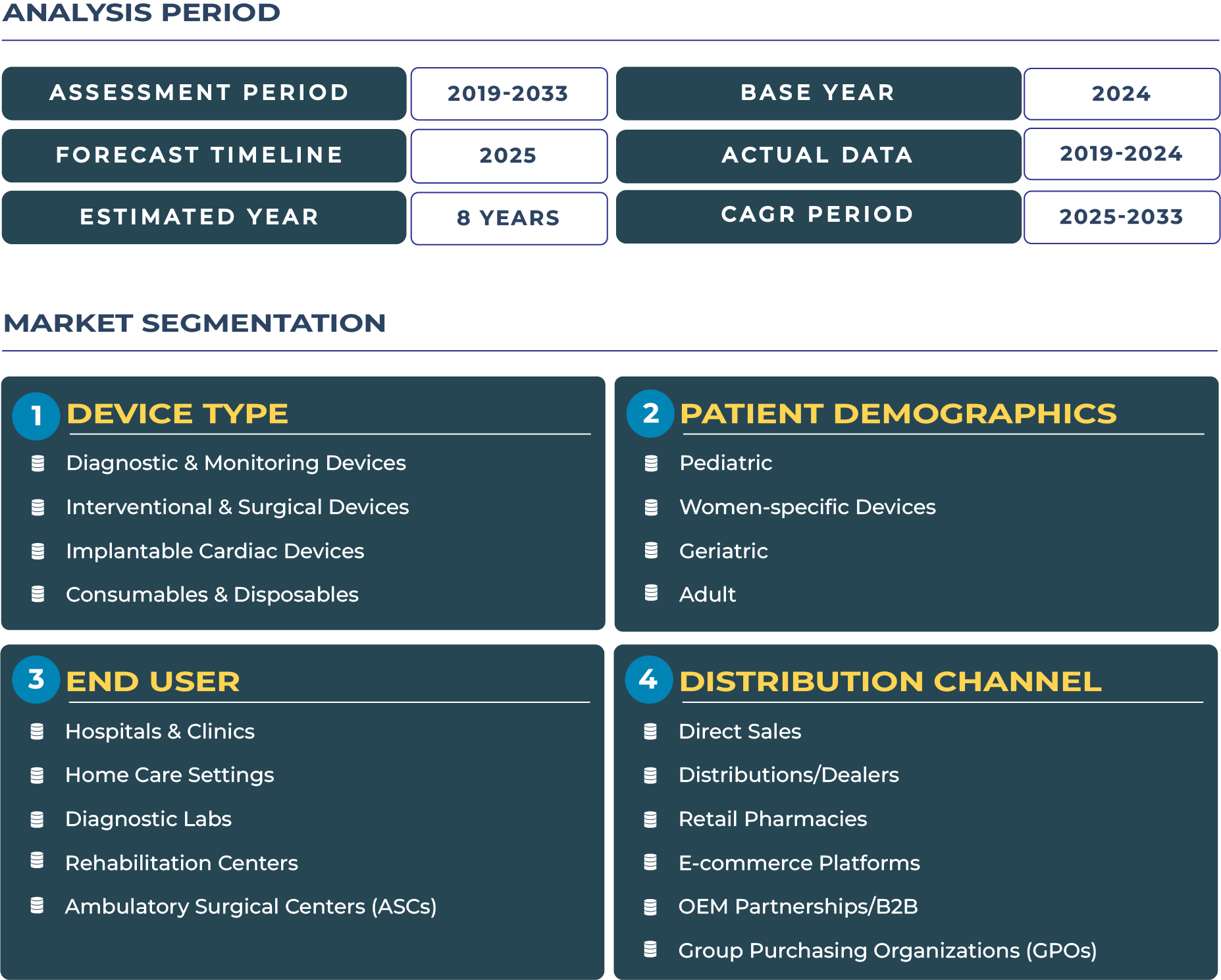Israel Cardiovascular Devices Market Outlook: Performance Balancing Innovation with Commercial Reality
The Israel Cardiovascular Devices Market is projected to grow from USD 34.0 million in 2025 to USD 35.6 million by 2033, registering a modest CAGR of 0.6%. Despite global recognition of Israel’s innovation-driven medtech sector, the relatively small domestic market size limits large-scale adoption. Instead, exports and strategic global partnerships are the primary growth channels, particularly for implantable devices and advanced diagnostic monitoring solutions. With high R&D intensity and world-class startups, the ecosystem thrives on commercialization abroad, even as local adoption remains constrained. These dynamics reinforce Israel’s position as an exporter of cardiac innovation rather than a volume-driven domestic market.
Israel Cardiovascular Devices Market: Startups and R&D Powering a Global Cardiac Innovation Hub
Israel has firmly established itself as a cardiovascular innovation hub, where medtech startups and strong R&D frameworks drive rapid commercialization of advanced cardiac solutions. The country’s cardiovascular devices industry benefits from a dense network of academic institutions, incubators, and venture-backed enterprises that translate prototypes into global exports. With a reputation for cutting-edge wearable diagnostics, implantable device breakthroughs, and interventional tools, Israel’s cardiovascular devices landscape is not just addressing domestic needs but shaping international cardiac care practices. This unique combination of entrepreneurial drive and scientific rigor continues to position Israel as a leading ecosystem for cardiac technologies.
Innovation-Driven Startup Ecosystem Anchoring Israel’s Cardiac Future
Israel cardiovascular devices market thrives on an innovation-led model, with the startup ecosystem at its core. Universities and research institutions act as breeding grounds for disruptive technologies, while government-backed programs create pathways for startups to commercialize prototypes at speed. The emphasis on wearable monitoring devices, interventional tools, and next-generation implantables reflects the country’s ability to anticipate global cardiac needs. Domestic demand, while modest, is reinforced by leading hospitals in Tel Aviv, Jerusalem, and Haifa that serve as clinical validation sites for early-stage products. These facilities attract international collaborations, offering startups key opinion leader (KOL) validation that accelerates entry into global markets. Despite geopolitical uncertainty and healthcare budget constraints, Israel continues to leverage its intellectual capital and medtech infrastructure to maintain leadership in cardiac innovation. The outlook suggests that by 2033, Israel’s cardiovascular devices ecosystem will remain export-focused, with commercial success heavily tied to partnerships with global device leaders and healthcare systems.
Drivers & Restraints: Understanding Israel Cardiovascular Devices Market Dynamics
Medtech Innovation and Startup Strength Fuel Market Evolution
Israel cardiovascular devices sector benefits from its vibrant medtech startup ecosystem, where early-stage ventures receive significant venture capital backing and government support. Rapid prototype-to-market cycles allow startups to test, refine, and commercialize devices quickly. For example, innovations in remote cardiac monitoring wearables and minimally invasive surgical devices are gaining traction through both domestic trials and global commercialization. The ability to generate intellectual property and attract global investors ensures continued flow of capital and innovation, driving the cardiovascular devices industry forward.
Small Domestic Market and Export Dependency Limit Growth
While innovation thrives, Israel’s relatively small population creates inherent limitations for large-scale domestic adoption of cardiovascular devices. This results in an overreliance on exports and global partnerships to achieve commercial viability. High expectations for rapid commercialization also place pressure on startups, leading to early-stage exits or dependence on multinational acquisitions. Additionally, geopolitical uncertainty and healthcare system budget constraints pose hurdles to domestic adoption of advanced implantable and surgical devices, slowing local demand in comparison to global recognition.
Trends & Opportunities: Shaping the Future of Israel Cardiovascular Devices Landscape
Wearables, Rapid Commercialization, and KOL-Led Trials Define Market Trends
Key trends in Israel cardiovascular devices market include the rapid development of wearable cardiac monitors and home-based diagnostic devices that address global demand for remote care solutions. The country’s hospitals serve as accelerators for prototype validation, with KOL-driven trials offering credibility that speeds global market entry. In cities like Tel Aviv and Haifa, innovation hubs create synergy between startups, clinicians, and investors, reinforcing the cycle of device commercialization. The integration of digital technologies with interventional and implantable devices further underscores the innovation-first trend shaping the market.
Global Partnerships and Local R&D as Key Market Opportunities
Opportunities for Israel cardiovascular devices industry lie in leveraging global partnerships and maximizing the commercial potential of R&D breakthroughs. Export-oriented strategies are already delivering results, with startups forming alliances with multinational corporations to scale production and access international regulatory pathways. Local consumable device manufacturing offers cost efficiency and resilience, while KOL-led clinical trials within Israel strengthen trust and adoption abroad. These opportunities allow Israel to remain a competitive force in the global cardiovascular devices landscape, despite domestic scale limitations.
Competitive Landscape: Global Reach Anchored by Local Innovation
The competitive environment of Israel’s cardiovascular devices sector is shaped by both startups and global players. Local innovators are known for spinning out breakthrough devices that often capture international attention through early-stage pilots. International companies such as Medtronic actively partner with Israeli startups, creating commercialization pathways and strengthening export markets. Recent developments include rapid prototype clinical pilots in leading hospitals, export-oriented partnerships, and acquisitions of early-stage startups by global medtech leaders. Strategies such as KOL engagement, collaboration with global partners, and accelerated commercialization define Israel’s unique competitive positioning as an innovation-driven export hub for cardiovascular devices.







